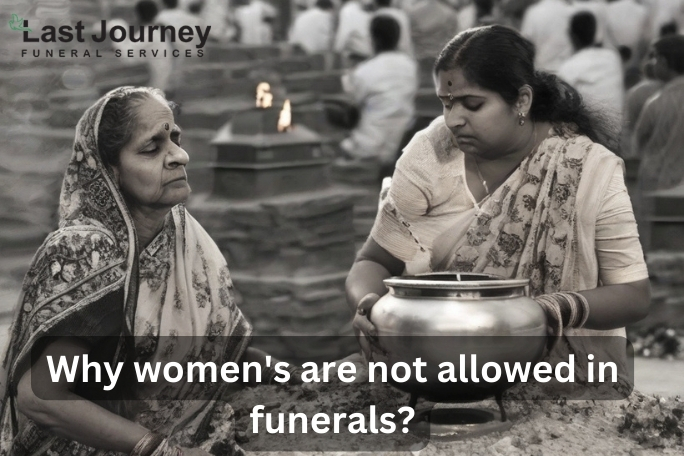Lastjourney Blog
Why women's are not allowed in funerals?

 Table of Contents
Table of Contents- What are the strengthening reasons behind the restriction of women in funeral and cremation rituals?
- What are the Islamic rulings regarding the inclusion of women in funerals & burials?
The reverence offered to the departed souls in the form of dignified final rites paves a peaceful path. In the Hindu culture, the final rites are performed according to a certain set of religious rules. From funeral to cremation to Asthi Visarjan to Shanti Path, each rite must follow the guidelines mentioned in the sacred scriptures of Hinduism.
One such custom included in the religious scriptures of Hinduism is, "Women are not allowed to attend the funeral procession of a deceased person as well as visit the cremation ground." However, the females who belong to the family of the deceased can join the funeral procession up to a small distance ahead of the home.
Though there is a prohibition of visiting the Cremation Ground or Crematorium for women in Hindu culture, the daughters are allowed to ignite the pyre of their parents if there is no son to perform the final rituals.
What are the strengthening reasons behind the restriction of women in funeral and cremation rituals?
Here are the beliefs accepted by most of the Hindu communities regarding the prohibition of women and girls in the funeral and cremation grounds.
1. Emotionally Challenging -
It is believed that distressing moments like funerals and cremation are quite difficult to witness for everyone. However, women are more sensitive and vulnerable to confront such emotional phases in comparison to men.
Therefore the family of the deceased does not allow them to visit the crematorium. Witnessing the visuals of igniting the pyre and burning the dead body of a beloved person can impact women immensely in a bad manner.
If a woman considers herself bold enough to see the painful goodbye of a close family member, she can accompany her male members of the family to cremation and funeral.
2. Too feeble to tackle the negativity -
The cremation grounds or crematoriums are considered the hub of all evil energies like ghosts or unsatisfied souls who can exert a dreadful impact on weak human bodies. It is also widely accepted that these malevolent energies can influence women and girls to their desirable misdeeds.
In some Hindu communities, married women are permitted to visit the funeral and cremation ritual but unmarried or virgin girls & women are prohibited from doing so. Behind this notion, it is believed that virgin women are pure and can fall prey to negative energies easily.
3. Inability to shave the heads -
The Hindu beliefs certify that negative energies make their avenue in the hair of humans. Therefore the lead mourner immediately shave his head before igniting the pyre of the deceased soul. The rest of the male members of the family shave their heads on the ninth or tenth day after the cremation day.
But in contrast, the females in some Hindu communities are not allowed to shave their heads as hair is considered their main beauty element. Therefore, Hindu culture prohibits the female members of the deceased's family from visiting the place of the cremation ritual.
4. Responsibility of maintaining the balance -
Most of the beliefs and faiths of Hindu culture are determined according to the practical lifestyle of the people. Behind the belief or notion of prevention of females from visiting the cremation places is also one such practical and widely accepted cause, that is, "Women can manage the home in a better way after a difficult phase."
In Hindu culture, when the male members take the deceased body to the cremation place, the females hold the whole and sole responsibility of cleaning the home. Consequently, the women avoid accompanying the male members of the family in the cremation ritual of the deceased body.
Though the majority of Hindu communities believe in the absence of women in the crematoriums, a few do not put any restrictions on females visiting the cremation ceremonies.
The women can sit or participate in the funeral procession in a separate group and mourn over the grief at the specifically demarcated area at the cremation ground or crematorium.
Related: Answering the Myths: Why females are not allowed in the cremation place?
What are the Islamic rulings regarding the inclusion of women in funerals & burials?
Each religion or sect has determined a few rules and regulations regarding the visiting of females in crematoriums or cremation places. According to the preaching of well-learned Islamic scholars and their holy scriptures, here are some guidelines recommended to women.
- According to Islamic beliefs, excessive lamentation on the passing of a person is forbidden. Since the women are unable to hold their emotions, they are not allowed to attend the funeral as well as visit the graveyard to witness the burial of their loved one.
- In some of the Islamic communities, the women are allowed to visit the graveyards but only after the completion of the burial rite. They can pray at the burial location for the peace of the departed soul.
- Some Muslim families allow only married and older females of the family to participate in the funeral and burial of the deceased person. Unmarried, virgin, and pregnant females should not visit the graveyards or attend funerals.
Conclusion-These above-listed guidelines regarding the noninclusion of females in the funeral and cremation rituals are rooted in beliefs with practically acceptable reasons. Hence the followers of Hinduism should comply with them.
However, with time, several changes are induced and accepted in the culture regarding the presence of female family members in funeral and cremation rites. These days the daughters are not only making their presence in the final rites of their beloved family members but also igniting the pyre during cremation if there is no son in the family.
Are the females allowed to attend the funeral and cremation in Hindu culture?
Your email address will not be published. Required fields are marked *












